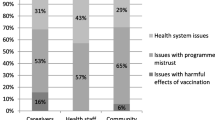Abstract
Vaccine hesitancy or lack of confidence in vaccines is considered a threat to the success of vaccination programs. The rise and spread of measles outbreaks in southern Africa in 2009–2010 were linked to objections among Apostolic Church members, estimated at about 3.5 million in Zimbabwe as of 2014. To inform planning of interventions for a measles–rubella vaccination campaign, we conducted an assessment of the factors contributing to vaccine hesitancy using data from various stakeholders. Among nine districts in three regions of Zimbabwe, we collected data on religious attitudes toward, and perceptions of, vaccines through focus group discussions with health workers serving Apostolic communities and members of the National Expanded Programme on Immunization; semi-structured interviews with religious leaders; and open-ended questions in structured interviews with Apostolic parents/caregivers. Poor knowledge of vaccines, lack of understanding and appreciation of the effectiveness of vaccinations, religious teachings that emphasize prayers over the use of medicine, lack of privacy in a religiously controlled community, and low levels of education were found to be the main factors contributing to vaccine hesitancy among key community members and leaders. Accepting vaccination in public is a risk of sanctions. Poor knowledge of vaccines is a major factor of hesitancy which is reinforced by religious teachings on the power of prayers as alternatives. Because parents/caregivers perceive vaccines as dangerous for their children and believe they can cause death or disease, members of the Apostolic Church have more confidence in alternative methods such as use of holy water and prayers to treat diseases. Under these circumstances, it is important to debunk the myths about the power of holy water on the one hand and disseminate positive information of the efficacy of vaccines on the other hand in order to reduce hesitancy. Education about vaccines and vaccination in conjunction with government intervention, for example, through the use of social distancing policies can provide a framework for reducing hesitancy and increasing demand for vaccination.

Similar content being viewed by others
Notes
“Chidzidzo are local health doctors who offer local medicine in the Apostolic community.
References
Andersson, E. (1958). Messianic popular movements in the lower Congo. London: Studia Ethnographica Upsaliensis XVI.
Daneel, M. L. (1970). Zionism and faith-healing in Rhodesia: Aspects of African independent churches. The Hague: Mouton & Co.
Gerede, R., Machekanyanga, Z., Ndiaye, S., Chindedza, K., Chigodo, C., Shibeshi, M. E., et al. (2017). How to increase vaccination acceptance among apostolic communities: Quantitative results from an assessment in 3 provinces in Zimbabwe. Journal of Religion and Health. doi:10.1007/s10943-017-0435-8.
Gresson, S., Zhuwau, T., Anderson, R. M., & Chandiwana, S. K. (1999). Apostles and Zionists: The influences of religion on demographic change in rural Zimbabwe. Population Studies, 53(2), 179–193.
Ha, W., Salama, P., Gwavuya, S., & Kanjala, C. (2014). Is religion the forgotten variable in maternal and child health? Evidence from Zimbabwe. Social Sciences & Medicine, 118, 80–88.
Hove, I., Siziya, S., Katito, C., & Tshimanga, M. (1999). Prevalence and associated factors for non-utilisation of postnatal care services: Population-based study in Kuwadzana Peri-Urban Area, Zvimba District of Mashonaland West Province, Zimbabwe. African Journal of Reproductive Health, 3(2), 25–32.
Maguranyanga, B. (2011). Apostolic religion, health and utilization of maternal and child health services in Zimbabwe. New York City: UNICEF.
Pomerai, K. W., Mudyiradima, R. F., & Gombe, N. T. (2012). Measles outbreak investigation in Zaka, Masvingo Province, Zimbabwe 2010. BMC, 5, 687.
Sundkler, B. (1961). Bantu prophets in South Africa. London: Oxford University Press.
Tumwine, J. K. (1999). Measles in Chimanimani, Zimbabwe. East African Medical Journal, 66(8), 531–534.
Author information
Authors and Affiliations
Corresponding author
Additional information
Disclaimer: The findings and conclusions in this report are those of the authors and do not necessarily represent the official position of the Centers for Disease Control and Prevention.
Rights and permissions
About this article
Cite this article
Machekanyanga, Z., Ndiaye, S., Gerede, R. et al. Qualitative Assessment of Vaccination Hesitancy Among Members of the Apostolic Church of Zimbabwe: A Case Study. J Relig Health 56, 1683–1691 (2017). https://doi.org/10.1007/s10943-017-0428-7
Published:
Issue Date:
DOI: https://doi.org/10.1007/s10943-017-0428-7




